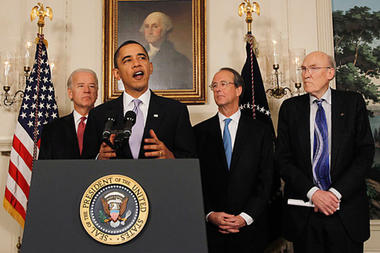Four months ago – just days after the Democrats' "shellacking" at the polls – a bipartisan commission offered President Obama the chance to retake the budgetary high ground from Republicans, who had positioned themselves as the party of fiscal sanity. The blue-ribbon deficit commission – led by Erskine Bowles, President Bill Clinton's budget negotiator, and former Republican Senator Alan Simpson – detailed its agenda for getting federal revenues and spending into balance, capping both at 21 percent of GDP over the next 25 years [PDF]. Transportation advocates were gratified to see a strong recommendation for a 15-cent increase in the gas tax to stabilize the Highway Trust Fund.

It was Obama’s opportunity to get out in front of the deficit issue, beating the GOP at its own game and potentially taking ideology out of deficit reduction by heeding the calls of a bipartisan group of esteemed experts.
Instead, the president let more than four months roll by while Republicans fought doggedly for budget cuts. Democrats, meanwhile, tried to balance spending cuts with keeping vital programs alive. All the while, the debate over the 2011 budget focused only on how much to cut from discretionary programs, a relatively small slice of the overall budget. (Discretionary spending like the federal transportation program is dwarfed by spending on the military, Social Security, and Medicare.) It made for a piecemeal and haphazard approach, and took some big bites out of infrastructure investment.
In Obama’s speech at George Washington University, he’s expected to throw his weight – finally – behind the deficit commission’s plan. A week after Rep. Paul Ryan, chair of the House Budget Committee, introduced his drastic plan to cut the deficit, it’s as good a time as any for the president to champion a bipartisan approach to balancing the federal budget.
For transportation advocates, this means two things. First, the deficit commission recommendations would put an end to panic-induced budget cuts of the sort we've seen this week, hacking at vital infrastructure programs. The commission's plan didn't just look at discretionary spending, it also examined military spending, entitlements, and how to actually raise revenue. Under this approach, transportation investment doesn't have such a fat target on its back.
Second, the deficit commission had a clear recommendation for stabilizing the Highway Trust Fund (in order to eliminate the need for emergency bailouts from the general fund): raise the gas tax. It recognized that requiring spending to be equivalent to the previous year’s revenue is a recipe for disaster if revenues are as low as they are now. In fact, the commission allows for general fund bailouts until a 15-cent gas tax is fully phased in (as opposed to the House Republicans' plan to starve infrastructure by holding spending to current revenues). After that, it limits spending to revenue levels. But with the gas tax almost doubled, even President Obama’s expansive program for infrastructure investment suddenly becomes possible.
Also, the commission would shift transportation spending into the “mandatory” column, rather than discretionary, which Obama also favors.
Meanwhile, other commission recommendations would reduce waste by eliminating earmarks, encouraging agencies to identify opportunities for savings, consolidating duplicative programs, and reducing the amount government spends on itself.
Of course, the big-ticket items in the report deal with entitlement reform and changes to the tax code. We at Streetsblog won't endorse or comment on those parts of the commission report or Obama’s proposal – they’re way above our pay grade. But if the president finally gets behind an adequate funding mechanism for infrastructure investment – we can get behind that.





